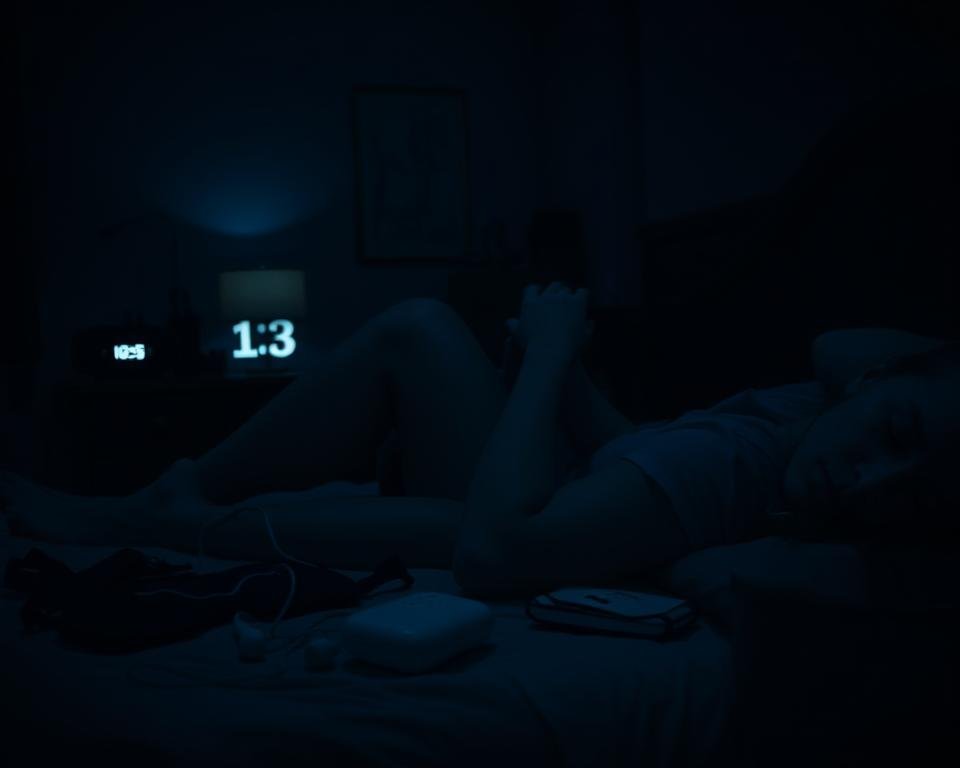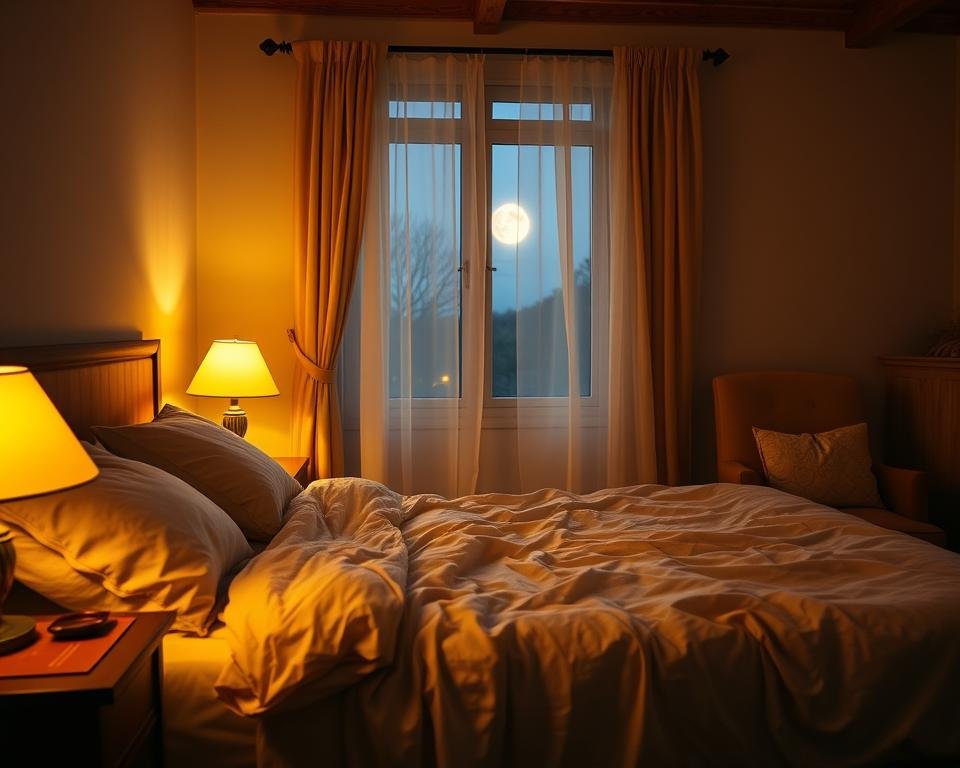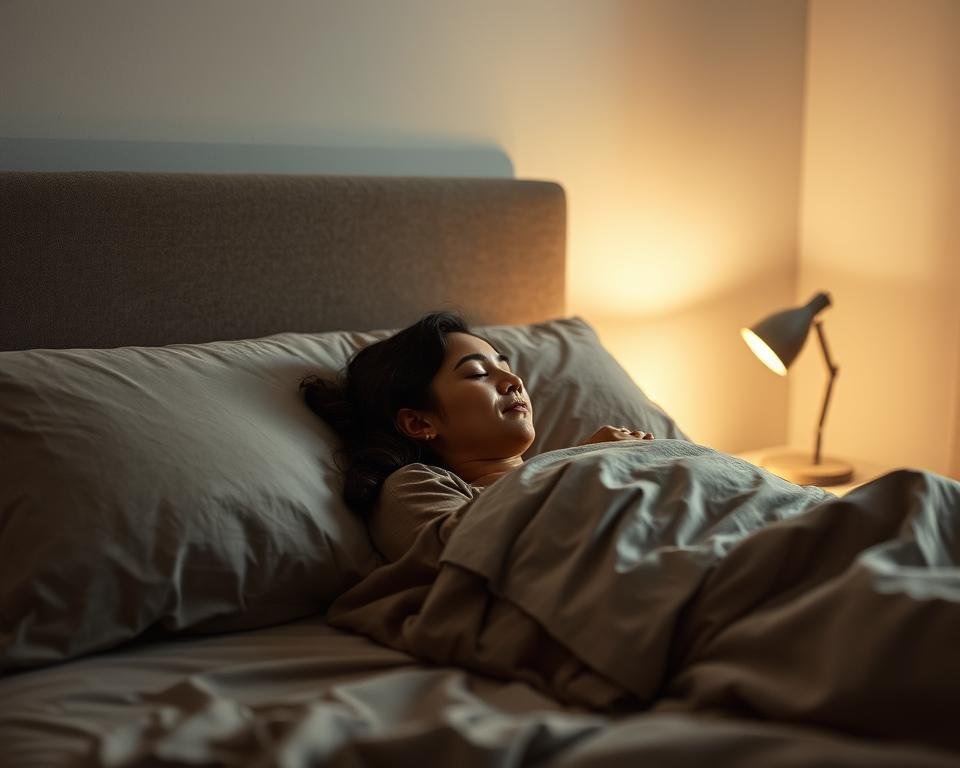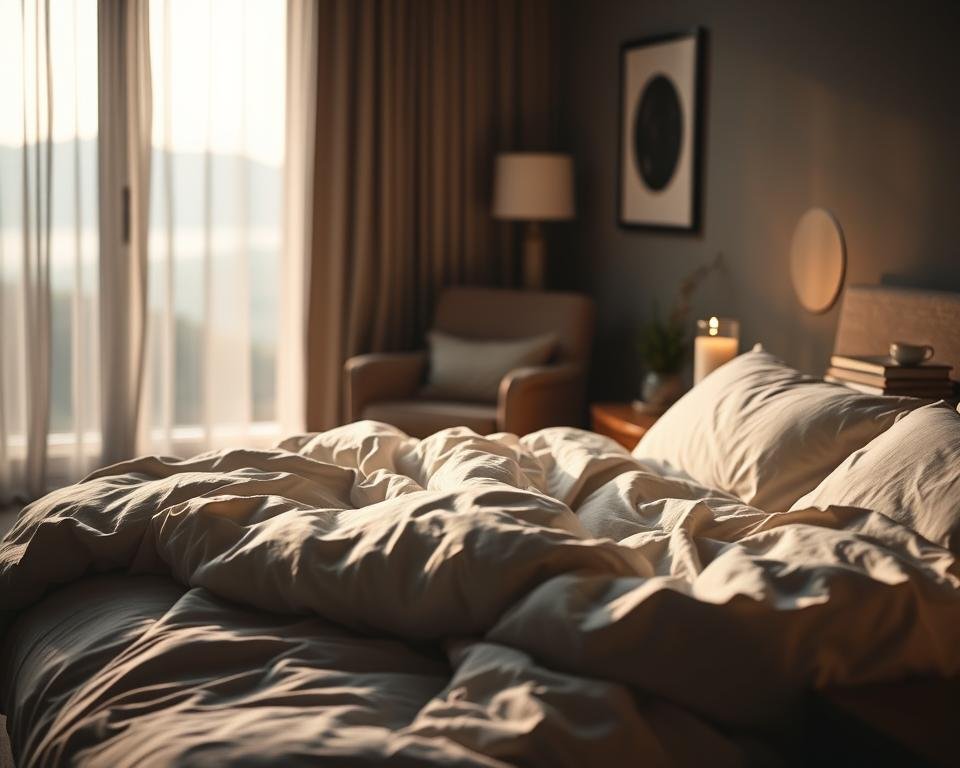A good night’s rest is key for our health. Exploring sleep techniques shows how important it is to know how to sleep well.
To sleep better, make your sleep space sleep-friendly. This means doing things that help you sleep well. By using these tips, you can wake up feeling great.
Key Takeaways
- Establish a consistent sleep schedule to regulate your body’s internal clock.
- Create a sleep-conducive environment by ensuring it is dark, quiet, and cool.
- Avoid screens and electronic devices before bedtime to improve sleep quality.
- Practice relaxation techniques, such as deep breathing or meditation, to calm your mind.
- Limit caffeine and heavy meals close to bedtime to promote better sleep hygiene.
Understanding the Importance of Sleep
Sleep is very important for our health. It helps our body fix and grow back damaged cells. It also helps build bone and muscle and makes our immune system stronger.
Why Sleep Matters for Health
Sleep is key for our health. It affects our heart and brain. Not getting enough sleep can increase the risk of heart disease, diabetes, and obesity.
Sleep disorders can make us feel tired, upset, and less productive. Sleep is essential for physical health. It lets our body fix and renew itself. It’s also important for our mental health, affecting our mood and how we think.
The Impact of Sleep on Everyday Life
Sleep changes our daily life in many ways. It affects our mood, how we think, and how well we do things. Not enough sleep can make us less focused, forgetful, and moody.
But, enough sleep makes us better at solving problems, being creative, and doing well in what we do.
- A good night’s sleep can make us happier and less stressed.
- Sleep helps control our hunger and metabolism, helping with weight.
- Enough rest improves our thinking, including focus and memory.
By making sleep a priority, we can live better and avoid sleep problems.
Common Sleep Disorders
Millions of people worldwide suffer from sleep disorders. These disorders can be mild or severe. They affect sleep quality and overall health.

Insomnia: Causes and Symptoms
Insomnia is a common sleep disorder. It makes it hard to fall or stay asleep. Causes include stress, anxiety, and irregular sleep schedules.
Symptoms include waking up too early and daytime fatigue. Knowing the cause is key to managing it. Changes in lifestyle can help.
Sleep Apnea: What You Should Know
Sleep apnea is a serious disorder. It causes breathing to stop during sleep. This can happen many times a night.
Symptoms include loud snoring and morning headaches. It can lead to heart disease and fatigue. Treatment includes lifestyle changes and CPAP machines.
Restless Leg Syndrome: Understanding the Basics
Restless Leg Syndrome (RLS) is a neurological disorder. It makes you want to move your legs, often with uncomfortable feelings. Symptoms get worse at night.
Managing RLS means knowing what triggers it. Changes in lifestyle, like exercise, can help. Medical treatments are also available.
Creating a Sleep-Friendly Environment
A sleep-friendly environment is key for good sleep. By making your bedroom better, you can sleep better too.
Ideal Bedroom Conditions for Sleep
Your bedroom should be a place for rest and sleep. Think about the temperature, humidity, and feel. A cooler bedroom, between 60-67 degrees Fahrenheit, is best for sleep. Also, keep the humidity right to avoid dryness and discomfort at night.

The Role of Light and Darkness
Light affects how we sleep and wake. Darkness makes us sleepy by producing melatonin. Use blackout curtains or shades to keep it dark. This helps block out streetlights and morning sun.
Noise Control Techniques
Noise can mess up your sleep. Use earplugs, white noise machines, or soundproofing to keep it quiet. White noise machines are great at hiding background sounds, making sleep better.
| Technique | Description | Effectiveness |
|---|---|---|
| Blackout Curtains | Blocking out light | High |
| Earplugs | Reducing noise | High |
| White Noise Machines | Masking background noise | High |
| Cooler Bedroom Temperature | Regulating body temperature | Medium |
Try these tips to make your bedroom better for sleep. This will help you sleep better and feel more rested.
Establishing a Bedtime Routine
Having a bedtime routine is key for better sleep and health. A regular routine tells your body it’s time to sleep. This leads to deeper rest.
How Routines Aid Sleep Quality
A bedtime routine helps your body switch from awake to sleep mode. This is important for quality sleep. Doing the same things each night trains your brain to sleep better.
Bedtime activities can be anything like reading or meditation. Or even a warm bath or soft music. The important thing is to be consistent and choose relaxing activities.
Evening Activities to Promote Rest
Doing calm things before bed can make sleep better. Some good activities include:
- Reading a book
- Practicing gentle stretches or yoga
- Listening to calming music or nature sounds
- Taking a warm bath
- Meditating or practicing deep breathing exercises
These activities lower stress and anxiety. This makes it easier to sleep deeply.

Technology’s Role in Sleep Hygiene
Technology can help or hurt sleep hygiene. Screens and blue light can mess with sleep. But, some apps and devices can also help relax and sleep.
Apps with guided meditation or white noise are great. But, it’s important to avoid screens for at least an hour before bed. This helps sleep better.
| Activity | Impact on Sleep | Tips for Better Sleep |
|---|---|---|
| Reading | Can be very relaxing | Choose a physical book over an e-reader |
| Meditation | Reduces stress and anxiety | Use guided meditation apps |
| Screen Time | Can interfere with sleep | Avoid screens for at least an hour before bed |
Choosing the Right Sleep Position
Knowing the best sleep position can make your sleep better. The way you sleep affects your sleep patterns and health.
Back, Side, or Stomach: Which is Best?
Each sleep position has good and bad sides. Back sleeping is good for your spine but might block your airway. Side sleeping helps with snoring but can hurt your shoulders and hips. Stomach sleeping is not recommended as it strains your neck.
Key Considerations for Each Sleep Position:
- Back Sleepers: Use a supportive pillow under your knees to take pressure off your spine.
- Side Sleepers: Choose a firmer mattress and consider a pillow between your knees to keep your hips aligned.
- Stomach Sleepers: Use a thin pillow or no pillow to keep your head in a neutral position.
The Impact of Body Alignment
Proper body alignment during sleep is key to avoiding pain. When your body is aligned right, you lower the risk of muscle and joint strain.
| Sleep Position | Body Alignment Tips | Benefits |
|---|---|---|
| Back | Supportive pillow under knees | Reduces strain on spine |
| Side | Pillow between knees | Aligns hips and reduces pressure |
| Stomach | Thin pillow or no pillow | Reduces strain on neck |
Pillows and their Importance
Pillows are key for a comfy sleep position. The right pillow supports your body and boosts sleep quality.

By picking the right sleep position and using good pillows, you can greatly improve your sleep. Try out different positions and pillow setups to find what’s best for you.
Natural Sleep Aids
If you’re looking for sleep help, natural aids are a good choice. Many people use them to fix sleep problems like insomnia. This helps keep their body’s sleep cycle in check.
Herbal Remedies to Consider
Herbal remedies have been used for ages to help people relax and sleep better. Valerian root, chamomile, and lavender are favorites. Valerian root is known to make sleep better and last longer. Chamomile tea also helps tell the body it’s time to sleep.
- Valerian root supplements
- Chamomile tea
- Lavender capsules or tea
Essential Oils for Relaxation
Essential oils can make bedtime relaxing. Oils like lavender and bergamot work well in a diffuser or on the skin. These oils can calm the mind and body, getting ready for sleep.

Using Melatonin: Pros and Cons
Melatonin helps control sleep and wake times. It’s good for sleep issues but has downsides. It can help those with insomnia or irregular sleep due to work or travel. But, long-term use can lead to dependence and may interact with other drugs. Always talk to a doctor before taking melatonin.
Exploring natural sleep aids can help you choose the best option for your sleep. Whether it’s herbal remedies, essential oils, or melatonin, there are many ways to improve sleep and well-being.
Mindfulness and Relaxation Techniques
Mindfulness practices are great for better sleep and well-being. They help manage stress and improve sleep quality.
Benefits of Meditation for Sleep
Meditation is a mindfulness practice that helps sleep. It reduces stress and anxiety, making it easier to sleep.
- Reduces stress and anxiety: Meditation calms the mind, helping with sleep deprivation.
- Improves sleep duration: Meditation promotes relaxation, leading to better sleep.
- Enhances sleep quality: Regular meditation makes sleep more restful and refreshing.

Breathing Exercises to Ease Tension
Breathing exercises help relax and improve sleep. They calm the nervous system, getting the body ready for rest.
- Diaphragmatic breathing: Deep, belly-expanding breaths calm the nervous system.
- 4-7-8 technique: Breathe in for 4 seconds, hold for 7, and exhale for 8 seconds.
Yoga Poses for a Better Night’s Sleep
Yoga combines movement with mindfulness, great for sleep. Certain poses relax the body and prepare it for sleep.
- Child’s Pose: A gentle stretch that relaxes and calms the mind.
- Legs Up the Wall Pose: Reduces leg swelling and promotes relaxation.
- Corpse Pose: Encourages deep relaxation and reduces stress.
Adding these mindfulness and relaxation techniques to daily routines can greatly improve sleep quality. It helps reduce sleep deprivation.
The Science of Sleep Cycles
The science of sleep cycles shows how we rest and stay healthy. Sleep is not just one thing but many stages. Each stage helps our body and mind get better.

Understanding REM and Non-REM Sleep
Sleep is mainly divided into REM and non-REM sleep. Non-REM sleep has three stages. Each stage has different brain waves and body responses.
The first stage is when we start to fall asleep. Our brain waves slow down. Then, in the second and third stages, we become less aware of the world around us.
The third stage is key for fixing our bodies. It’s the most restful part of sleep.
REM sleep is when our eyes move fast, our brain is active, and we dream a lot. It helps us remember things and learn new stuff.
How Sleep Cycles Affect Restfulness
How well we sleep depends on our sleep cycles. A full cycle lasts about 90 minutes. It has both non-REM and REM stages.
Disruptions to normal sleep cycles can cause problems. Waking up during deep sleep can make us feel very tired and confused.
Knowing about our sleep cycles can make our sleep better. By understanding our sleep patterns and our circadian rhythm, we can improve our health and feel more rested.
Nutrition and Sleep Quality
Diet affects sleep hygiene and sleep quality a lot. What we eat can help us sleep better or make insomnia worse. Choosing the right foods can help us wake up feeling good.
Foods that Promote Better Sleep
Some foods help us sleep better because of what they have in them. For example, turkey and chicken have tryptophan. This helps make serotonin and melatonin, which help us sleep. Other foods that help sleep include:
- Complex carbohydrates like whole-grain bread and cereals
- Fatty fish, which are high in vitamin B6 and magnesium
- Nuts and seeds, like almonds and pumpkin seeds
The Impact of Caffeine and Sugar
Caffeine and sugar can hurt our sleep. Caffeine keeps us awake, and sugar gives us a quick energy boost then crashes. Avoiding these before bed helps us sleep better.
Hydration and Sleep Interactions
Drinking water is good for us, but too much before bed can wake us up. Drinking water all day helps our sleep hygiene. Also, avoiding caffeine and alcohol helps us sleep through the night.
By watching what we eat, we can sleep better and avoid insomnia.
When to Seek Professional Help
Knowing when to get help for sleep disorders is key. If sleep problems last a long time, it’s time to see a sleep expert.
Signs It’s Time to Visit a Sleep Specialist
If you have insomnia, sleep too much during the day, or snore loudly, get help. Also, if you can’t stay asleep, have restless legs, or feel tired all the time, it’s a sign to see a doctor.
These signs mean you might have a serious sleep problem. A sleep doctor can find and fix these issues.
Common Sleep Studies Explained
Sleep studies help figure out sleep problems. Here are a few:
- Polysomnography (PSG): an overnight study that tracks your body while you sleep.
- Multiple Sleep Latency Test (MSLT): checks how sleepy you are during the day.
- Home Sleep Apnea Testing (HSAT): tests for sleep apnea at home.
Treatment Options Available
Treatments depend on what the doctor finds. Here are some common ones:
| Treatment | Description |
|---|---|
| Cognitive Behavioral Therapy for Insomnia (CBT-I) | A way to fix sleep problems without medicine. |
| Continuous Positive Airway Pressure (CPAP) | A device to keep airways open, used for sleep apnea. |
| Oral Appliances | Custom devices to keep the airway open while sleeping. |
Getting help from a professional can fix sleep disorders. This improves your sleep and health.
Tips for Better Sleep While Traveling
Traveling can be exciting, but it often disrupts our sleep patterns. To minimize this impact, it’s essential to maintain good sleep hygiene, even when on the go.
Adjusting to New Time Zones
Dealing with jet lag effectively is key for a comfortable trip. Start adjusting your sleep schedule a few days before traveling. This helps your body adapt to the new time zone, reducing strain on your circadian rhythm.
Comfort on the Go
Creating a sleep-friendly environment is vital, even in a hotel room or on a plane. Bring a travel pillow, earplugs, or a sleep mask. These can greatly improve your ability to rest.
Staying on Schedule
Maintaining a routine while traveling helps preserve your sleep patterns. Stick to your regular bedtime and wake-up times as closely as possible. This makes a big difference in how rested you feel during your trip.
FAQ
What are some common sleep disorders that affect people?
Common sleep disorders include insomnia, sleep apnea, and restless leg syndrome. They can really hurt your sleep quality and how you feel overall.
How can I create a sleep-friendly environment in my bedroom?
To make your bedroom sleep-friendly, keep it cool. Use blackout curtains and try to keep it quiet.
What is the role of a bedtime routine in improving sleep quality?
A bedtime routine tells your body it’s time to sleep. This can lead to better rest and sleep quality.
How does sleep position affect the quality of my rest?
Your sleep position matters. Sleeping on your back, side, or stomach can affect your sleep. Keeping your body aligned is key for a good night’s sleep.
Are there any natural sleep aids that can help me sleep better?
Yes, there are natural sleep aids like herbal remedies, essential oils, and melatonin. They can help you relax and sleep better. But, it’s important to know their pros and cons.
Can mindfulness and relaxation techniques really improve my sleep?
Yes, mindfulness, breathing exercises, and yoga can help you relax. They prepare your body for sleep, improving your sleep quality.
How does nutrition impact my sleep quality?
Eating a balanced diet that includes sleep-promoting foods is key. Avoid caffeine and sugar. Staying hydrated also helps with sleep.
When should I seek professional help for my sleep issues?
If you have ongoing sleep problems, see a sleep specialist. They can find the cause and suggest treatments.
How can I maintain good sleep while traveling?
To keep good sleep while traveling, deal with jet lag well. Make your travel space comfortable. Try to keep a routine.
What is sleep hygiene, and how can I practice good sleep hygiene?
Sleep hygiene means doing things that help you sleep better. Keep a regular sleep schedule. Avoid screens before bed. Make your bedroom sleep-friendly.
How does the circadian rhythm affect my sleep patterns?
Your circadian rhythm controls when you sleep and wake. Knowing how it works can help you sleep better and improve your overall sleep quality.







